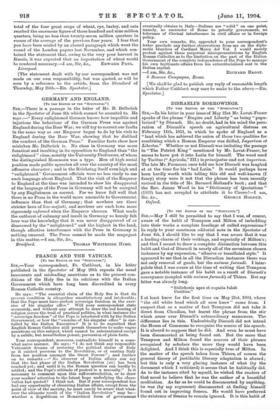FRANCE AND THE VATICAN.
[To THE EDITOR OP THE "SPECTATOR."] Snt„—Your correspondent, Fr. Cuthbert, in his letter published in the Spectator of May 28th repeats the usual inaccurate and misleading assertions as to the present con- ditions of the Holy See in its relations with the Italian Government which have long been discredited in every
Roman Catholic country.
He says: "The essential claim of the Holy See is that its present condition is altogether unsatisfactory and intolerable; that the Pope must have perfect sovereign freedom in the exer- cise of his singular office." Will your correspondent state accurately, and without any attempt to draw the red herring of religion across the trail of practical politics, in what instance the "sovereign freedom" of the Pope is interfered with by the Italian Government, or how the "exercise of his singular office" is cur- tailed by the Italian Executive ? It is to be regretted that English Roman Catholics still permit themselves to make vague assertions on this subject, which cannot be substantiated except by a subtle, but nevertheless potent, perversion of plain facts.
Your correspondent, moreover, contradicts himself in a some- what naive manner. He says : "I do not think any responsible Vaticanist dreams of restoring the political status of Italy as it existed previous" to the Revolution, or of ousting Italy from her position amongst the Great Powers " ; and further on he remarks :—" No observer of Italian affairs can say that the last phase of the Italian Revolution [sic] has been reached yet ; and until it is, the Roman question can hardly be settled; and the Pope's attitude of protest is a necessity." Is it necessary to comment upon this self-contradiction, or to draw your readers' attention to the latent hope underlying the obser- vation bat quoted ? I think not. But if your correspondent has had any opportunity of observing Italian affairs, except from the point of view of the sacristy, he must surely be aware that what- ever the ultimate result of the "Italian Revolution" may be— whether a Republican or Monarchical form of government
eventually obtains in Italy—Italians are "solid" on one point, namely, no surrender of Rome to priestly government, no tolerance of Clerical interference in civil affairs or in foreign Your own remarks, Sir, appended to your correspondent's letter preclude any further observations from me on the diplo- matic blunders of Cardinal Merry del Val. I would merely protest against these perpetual misrepresentations by English Roman Catholics as to the limitation on the part of the Italian Government of the complete independence of the Pope to manage his own legitimate affairs from his exterritorialised seat in the Italian capital.
—I am, Sir, &c., RICHARD EAGOT.
6 Sornma Campagna, Borne.
[We shall be glad to publish any reply of reasonable length which Father Cuthbert may care to make to the above.—ED. Spectator.]










































 Previous page
Previous page